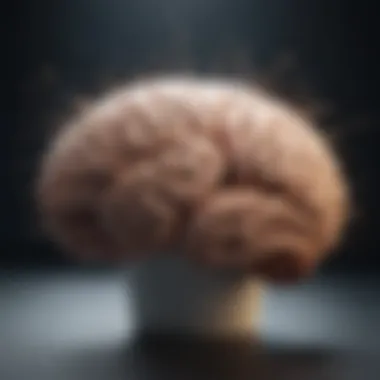Exploring Caffeine Withdrawal: Impacts and Management


Intro
Caffeine is one of the most widely consumed psychoactive substances in the world. Many individuals rely on caffeine for its stimulating effects, commonly found in coffee, tea, and energy drinks. However, for those who consume caffeine regularly, sudden withdrawal can lead to a range of uncomfortable symptoms. These symptoms can affect both the body and mind, creating a significant challenge for individuals trying to cut back on caffeine consumption.
When caffeine intake is abruptly halted, many people experience withdrawal symptoms that can include headaches, fatigue, irritability, and difficulty concentrating. Understanding the mechanisms behind these symptoms is key to managing this common phenomenon effectively. Moreover, recognizing the impact of caffeine dependency is essential in assessing the broader implications for healthcare and lifestyle choices.
This article seeks to explore the intricate nature of caffeine withdrawal. By examining its physiological and psychological components, we will provide a comprehensive overview of not only the withdrawal experience itself but also the strategies available for managing its symptoms and facilitating a smoother transition for caffeine users.
Understanding Caffeine and Its Popularity
Understanding the popularity of caffeine is crucial when examining caffeine withdrawal. Caffeine occupies a unique position in global culture. Millions rely on it for its stimulating properties each day. The consumption of caffeine has increased notably in recent decades. This rise is linked to lifestyle changes, work demands, and the demand for increased alertness. Thus, exploring its prevalence sets the stage for understanding withdrawal.
The Global Consumption of Caffeine
Caffeine is one of the most widely consumed psychoactive substances in the world. Research indicates that approximately 80% of adults consume at least one caffeinated beverage daily. From coffee to soft drinks and energy drinks, the variety is vast. This widespread usage suggests a global dependency, which raises questions about the impacts of cessation.
Caffeine Sources and Interactions
Caffeine is found in various sources, each contributing differently to the overall consumption patterns and effects.
Coffee
Coffee is arguably the most popular source of caffeine. It is famous for its rich flavor and aroma. The primary component, caffeine, is a central nervous system stimulant which many people rely on to improve focus and productivity. Its contribution to society goes beyond alertness; it fosters social connections. Drinking coffee is often a communal activity that encourages conversations. However, high consumption can lead to dependency, highlighting its significance in withdrawal discussions.
Tea
Tea is another significant source of caffeine. It is consumed globally and ranges from black tea to green tea and herbal blends. One notable distinction between tea and coffee is the presence of L-theanine in tea. This compound can mitigate caffeine's adverse effects, providing a smoother energy boost. Tea drinkers often report lower levels of anxiety compared to coffee drinkers. This can make tea an appealing choice for those concerned with the side effects of caffeine. However, the levels of caffeine vary significantly among different types of tea.
Energy Drinks
Energy drinks have surged in popularity, especially among younger populations. They often contain high levels of caffeine combined with sugar and other stimulating substances. This combination can provide a quick boost of energy, appealing for sports or long study sessions. Nevertheless, their excessive consumption poses risks such as increased heart rates and anxiety. These aspects make them a considerable factor in discussions about caffeine withdrawal.
Medication
Caffeine is not only a recreational substance but also a component in some medications, particularly pain relievers. Its inclusion can enhance the effectiveness of analgesics like ibuprofen. Taking medication with caffeine may help alleviate headaches faster. However, individuals using caffeine-containing medications may unknowingly develop a dependence. This dependency can complicate recovery from caffeine withdrawal, making it crucial to understand medication interactions as part of this topic.
Defining Caffeine Withdrawal
Understanding caffeine withdrawal is a vital component of the broader discussion surrounding caffeine use and its effects on the human body. Caffeine is one of the most widely consumed psychoactive substances, and for many individuals, it becomes a regular part of their daily routine. However, the abrupt cessation of caffeine intake can lead to a series of physiological and psychological symptoms that significantly affect one's daily life. Delving into this topic provides clarity on what caffeine withdrawal entails, its mechanisms of action, and its implications for both health and wellbeing.
What is Withdrawal?
Withdrawal, in general terms, refers to a set of symptoms that appear when an individual reduces or stops ingesting a substance to which they have become dependent. Caffeine withdrawal specifically occurs when someone who regularly consumes caffeine suddenly decreases or eliminates their intake. The symptoms of caffeine withdrawal can be diverse, manifesting both physically and psychologically. Key aspects of withdrawal include:
- Onset and Duration: Withdrawal symptoms typically emerge within 12 to 24 hours after the last caffeine dose. The duration can vary between individuals but usually lasts up to a week.
- Severity of Symptoms: The intensity of symptoms can differ based on factors such as the quantity of caffeine consumed before cessation and individual tolerance levels.
Comprehending these elements helps us grasp the potential disruption that caffeine withdrawal can cause in one's life.
Caffeine Dependence and Its Mechanisms
Caffeine dependence arises from prolonged exposure to caffeine, which alters brain chemistry and leads to the development of tolerance. When consumed, caffeine blocks the action of adenosine, a neurotransmitter that promotes sleep and relaxation. This blockade results in increased neuronal firing, which can lead to enhanced mood and alertness. Over time, the brain adapts to continual caffeine presence by adjusting its sensitivity to adenosine. This means that when caffeine is abruptly removed, there is a relative overactivity of adenosine, which leads to fatigue, headaches, and other withdrawal symptoms.
There are several mechanisms at play:
- Neurotransmitter Imbalance: The abrupt withdrawal of caffeine leads to an excess of adenosine, causing fatigue and sleepiness.
- Changes in Blood Flow: Caffeine also influences blood flow to the brain. When caffeine is removed, this can cause headaches as blood vessels dilate, leading to changes in pressure.
- Psychological Effects: Caffeine also plays a role in mood regulation. Withdrawal can provoke irritability and depressive symptoms.
Understanding caffeine dependence not only sheds light on the withdrawal process but also highlights the resilience of human biology in adjusting to habitual substance use.
Symptoms of Caffeine Withdrawal
Understanding the symptoms of caffeine withdrawal is crucial for anyone who has a dependency on caffeine. These symptoms can vary greatly among individuals, influencing both physical and psychological well-being. Recognizing these signs can help manage them effectively. Moreover, awareness can facilitate a smoother transition during caffeine cessation, minimizing potential distress.
Physical Symptoms
Headache
Headaches are one of the most common manifestations of caffeine withdrawal. They can range from mild to severe, and typically occur within a day after the last caffeine intake. This symptom is characterized by a throbbing feeling, usually localized in the front or sides of the head. The primary reason headaches occur is due to changes in blood flow to the brain. When caffeine intake is reduced, blood vessels that had constricted begin to dilate, leading to increased blood flow and subsequent pain. This makes headaches not only prevalent but also significant when discussing withdrawal. The severity and potential duration of these headaches can influence individuals' decisions regarding caffeine consumption, making it a key point of focus.
Fatigue
Fatigue commonly follows the cessation of caffeine, contributing to the overall lethargy that many experience. It is characterized by an overwhelming sense of tiredness and lack of energy. Because caffeine acts as a stimulant, its absence can lead to a stark contrast in energy levels, making fatigue a prominent symptom. This symptom can impede daily activities, affecting productivity and motivation. Acknowledging fatigue is essential for understanding how withdrawal can impact daily life and decision-making regarding caffeine use.


Nausea
Nausea is another noteworthy symptom that arises during caffeine withdrawal. This sensation can be quite uncomfortable, often leading to a lack of appetite or reluctance to eat. Nausea during withdrawal can arise due to hormonal changes and fluctuations in gut activity that occur when caffeine is suddenly removed from the diet. This symptom's presence can discourage individuals from quitting caffeine entirely. Thus, it is important to discuss its implications in any conversation about withdrawal management.
Psychological Symptoms
Irritability
Irritability is a significant psychological symptom of caffeine withdrawal. Affected individuals often report mood swings and a sense of frustration that can emerge quickly, especially when feeling the withdrawal effects. The absence of caffeine disrupts normal brain chemistry, leading to increased irritability and mood dysregulation. Awareness of this symptom can benefit individuals in terms of tolerance during this adjustment period, and preparation can mitigate frustration while transitioning to a caffeine-free lifestyle.
Depression
Depression can surface as a psychological sequel to caffeine withdrawal. This aspect is complex as it intertwines with existing mood disorders and stress levels. The effect of reduced caffeine can inadvertently lead to feelings of sadness or low motivation. Recognizing this symptom's potential depth is important; not only can it lead to a temporary state of despair, but it can also complicate any ongoing mental health conditions. Therefore, addressing depression's complexities in caffeine withdrawal is vital.
Difficulty Concentrating
Difficulty concentrating represents another notable psychological symptom. Without caffeine's stimulating effects, cognitive function may feel hampered, leading to issues such as forgetfulness or inability to focus on tasks. This complication is significant as it poses challenges in professional and academic environments. Acknowledging and preparing for potential concentration problems can be beneficial in managing the withdrawal period. Developing alternative strategies during this time may help offset cognitive disruptions.
The Timeline of Withdrawal Symptoms
Understanding the timeline of withdrawal symptoms is crucial for anyone experiencing caffeine withdrawal. Knowing when symptoms may start and how long they can last helps individuals prepare mentally and physically for the process. The withdrawal symptoms serve as the body’s response to the sudden absence of caffeine, highlighting caffeine’s role in maintaining normal physiological balance. Recognizing these timelines can facilitate smoother transitions and better management of withdrawal effects.
Onset of Symptoms
The onset of symptoms typically begins 12 to 24 hours after the last caffeine intake. This period marks the body’s reaction to the lack of caffeine, which it has grown accustomed to. At this early stage, many individuals report mild headaches or a general feeling of fatigue, which can often be mistaken for typical tiredness.
It is important to note that the severity of symptoms can vary significantly among individuals. Some may experience symptoms sooner, while others might not notice anything until later. Factors influencing this onset include the amount of caffeine regularly consumed and individual tolerance levels.
- Common early symptoms can include:
- Headaches
- Fatigue
- Irritability
Understanding this phase is vital for setting expectations and planning adequate tasks or responsibilities around the onset.
Duration of Symptoms
The duration of caffeine withdrawal symptoms can range from two days to up to a week, depending largely on the individual’s consumption patterns and overall health. Generally, symptoms peak around 24 to 48 hours after cessation, and this peak is often when the symptoms feel most intense. After this peak, symptoms typically start to gradually diminish, but some may linger.
The most commonly reported withdrawal symptoms include:
- Physical Symptoms:
- Psychological Symptoms:
- Headaches
- Nausea
- Muscle pain
- Difficulty concentrating
- Anxiety
- Mood swings
It’s crucial for individuals experiencing withdrawal to allow themselves time to recover, recognizing that these symptoms are temporary but can significantly disrupt daily life. Monitoring the duration can also aid in recognizing patterns that might inform future caffeine consumption habits.
"The effects of caffeine withdrawal should not be underestimated as even small alterations in consumption can lead to notable discomfort."
By understanding the timeline of withdrawal symptoms, individuals can better manage their caffeine cessation journey, identify resources if needed, and strategize effectively.
The Science Behind Withdrawal Symptoms
Understanding the science behind caffeine withdrawal symptoms is essential for comprehending how the body reacts when caffeine intake suddenly stops. This section looks at the underlying mechanisms that fuel the symptoms, which range from headaches to mood changes. Knowledge of these mechanisms not only aids in managing withdrawal but also highlights the physiological dependence that some individuals develop on caffeine. By uncovering the neurological and physiological factors at play, readers can appreciate the complexities of caffeine’s interaction with the body and its effects during withdrawal.
Neurological Changes
The brain responds to caffeine by increasing dopamine production, impacting mood and attention. Upon cessation, a notable drop in dopamine levels occurs. This may contribute to feelings of irritability and apathy, commonly reported during withdrawal. The adenosine receptors in the brain also play a critical role. Caffeine blocks these receptors, promoting wakefulness. Once caffeine consumption stops, the body has to readjust by reactivating these receptors. The brain's adaptation period creates an imbalance, often leading to headaches and fatigue as the brain attempts to regain equilibrium.
The following key points summarize the neurological changes while withdrawing from caffeine:
- Dopamine fluctuation: Decreased mood, motivation, and alertness due to lower dopamine production.
- Adenosine receptor activation: Increased sensitivity to fatigue signals can lead to enhanced drowsiness and lethargy.
- Cognitive effects: Difficulty concentrating and reduced cognitive function as the brain struggles to normalize its chemistry.
"Caffeine withdrawal illustrates the brain's adaptability and its fundamental processes in maintaining homeostasis."
Physiological Responses
Physiologically, withdrawal from caffeine prompts a series of changes in the body. Caffeine affects blood vessels by causing constriction. When caffeine is removed, these vessels dilate and can trigger headaches. Additionally, the central nervous system becomes more sensitive. This may lead to symptoms such as fatigue, nausea, and even flu-like symptoms in some individuals.
Other physiological responses can include:


- Changes in blood flow: A potential explanation for the headaches many experience when stopping caffeine.
- Alterations in metabolism: Slower metabolic rates can cause a drastic drop in energy levels.
- Altered sleep patterns: Sleep may initially become disturbed as the body adjusts to the absence of stimulants.
In summary, both neurological changes and physiological responses intertwine to shape the withdrawal experience. Recognizing these underlying processes can help individuals better manage symptoms as they navigate caffeine withdrawal.
Factors Influencing Withdrawal Severity
Understanding the factors that influence the severity of caffeine withdrawal is crucial for both academic and practical applications. Caffeine withdrawal is not merely a matter of reduced consumption; it involves intricate bodily and psychological responses. Several factors play a role in determining how an individual experiences these withdrawal symptoms.
Caffeine Consumption Patterns
Caffeine consumption patterns are significant in shaping the intensity of withdrawal. Individuals who consume caffeine regularly tend to develop a dependence. This dependence can range from moderate to heavy use, influencing how one may react to abrupt cessation. For instance, someone who consumes high doses of caffeine daily is more likely to experience intense withdrawal symptoms than an occasional user.
Patterns of intake also matter. If caffeine is consumed throughout the day, the body becomes accustomed to steady levels of the stimulant. Sudden cessation from such a pattern can lead to sharper symptoms, causing discomfort that can last several days.
Additionally, the type of caffeine source — whether from coffee, tea, or energy drinks — can affect withdrawal experiences. Different sources impact absorption rates and the duration of effects, contributing to dependency effects.
Individual Variability
Individual variability encompasses genetic and physiological differences that affect how people metabolize caffeine. This variability is essential in creating a personalized understanding of caffeine withdrawal.
Genetic Factors
Genetic factors are crucial in caffeine metabolism. Specific enzymes in the liver, mainly cytochrome P450 1A2, influence how quickly caffeine is broken down. Some individuals possess a variant of this gene that leads to slower metabolism of caffeine. As a result, they may experience heightened withdrawal effects due to accumulated caffeine, making withdrawal feel more profound.
Moreover, the unique genetic makeup of individuals determines their sensitivity to caffeine in the first place. For instance, those with increased sensitivity may find that reducing caffeine significantly impacts their overall well-being.
Tolerance Levels
Tolerance levels to caffeine represent how the body adapts to regular caffeine consumption. Over time, as one consumes caffeine consistently, the body's response diminishes. Higher tolerance means that more caffeine is required to achieve previous effects. When such an individual suddenly stops consuming caffeine, the resulting withdrawal is typically more severe.
This aspect of tolerance highlights the potential risks involved in increased caffeine consumption over time. Understanding tolerance can help in creating strategies for more effective management of withdrawal, offering insights into gradual reduction techniques and potential interventions.
Management of Caffeine Withdrawal
Effective management of caffeine withdrawal is critical for individuals experiencing the discomfort that often accompanies stopping caffeine intake. It is important to recognize the challenges posed by withdrawal symptoms, which can significantly impact daily activities and overall well-being. Understanding the different strategies available for managing these symptoms provides a pathway to minimize discomforts while fostering a healthier relationship with caffeine.
Gradual Reduction Strategies
Gradual reduction of caffeine intake is one of the most recommended approaches when managing withdrawal symptoms. This method allows the body to adjust slowly to decreasing caffeine levels, which can help in minimizing symptoms such as headaches and fatigue. A step-by-step process may involve:
- Identifying Current Intake: Begin by assessing how much caffeine is consumed daily through various sources like coffee, tea, or energy drinks.
- Setting Goals: Decide on a target reduction, such as decreasing daily intake by 25% each week.
- Replacing Beverages: Substitute regular caffeine sources with decaffeinated options or herbal teas to satisfy cravings without increasing caffeine intake.
Implementing these strategies can significantly ease the transition. It may take several weeks but allows for better symptom management.
Hydration and Nutrition
Hydration plays a significant role in alleviating caffeine withdrawal symptoms. Water helps combat fatigue and headaches that may arise from withdrawal. Additionally, proper nutrition supports overall health during this transition. Specific considerations include:
- Drinking Enough Water: Aim for at least 8 cups of water per day to stay hydrated.
- Balanced Diet: Incorporate foods rich in vitamins and minerals to support energy levels. Fruits, vegetables, whole grains, and proteins are essential.
- Foods to Avoid: Reduce sugar intake as it can exacerbate energy crashes, leading to increased irritability.
Overall, proper hydration and nutrition contribute to better coping mechanisms during caffeine withdrawal, promoting a more positive experience as the body adjusts.
Over-the-Counter Remedies
Certain over-the-counter remedies can help alleviate symptoms associated with caffeine withdrawal. These options should be considered based on individual needs and preferences. Some common remedies include:
- Pain Relievers: Non-prescription medications like ibuprofen or acetaminophen can help manage headache symptoms.
- Vitamins and Supplements: B vitamins and magnesium may aid in reducing fatigue and support neurological function.
- Electrolyte Drinks: Replacing lost electrolytes can help improve overall energy levels and lessen withdrawal effects.
Before utilizing these remedies, it is advisable to consult a healthcare professional to ensure the best approach tailored to individual needs. Proper management of caffeine withdrawal not only eases the transition but also sets a sustainable path for using caffeine in a healthier manner.
Long-term Implications of Caffeine Withdrawal
The long-term implications of caffeine withdrawal hold significant importance in understanding how discontinuation affects individuals over time. Withdrawal might seem a temporary phase, but its effects can ripple through various aspects of one’s life. Acknowledging these implications can aid people in navigating their withdrawal experience more effectively and gaining deeper insights into caffeine dependence.
Potential for Habit Reversal
The potential for habit reversal is an essential consideration when discussing long-term caffeine withdrawal. Many individuals consume caffeine as part of their daily routine, often without realizing the extent of their dependence. When one ceases caffeine intake, it may lead to reflective moments about their consumption habits.
This reflection can empower individuals to break not only the dependency on caffeine but also other unhealthy habits in their lives. For example, a person might find that they can replace their coffee breaks with healthier activities, like taking a short walk or engaging in a mindfulness practice. This can contribute to a more mindful lifestyle and promote overall well-being.
Regular assessments of one’s habits can also enhance self-awareness, potentially leading to better health choices in the long run. It is crucial for individuals undergoing caffeine withdrawal to recognize this opportunity for personal growth and habit improvement.


Impacts on Mental Health
The implications of caffeine withdrawal on mental health are profound and merit serious attention. Many people rely on caffeine for its stimulating effects, often using it as a crutch to manage fatigue or stress. When caffeine is withdrawn, the sudden absence can leave individuals feeling vulnerable, resulting in increased anxiety, mood swings, and even depressive symptoms.
Studies suggest that the severity and duration of withdrawal symptoms can correlate with increased odds of experiencing mental health difficulties. Understanding this connection is vital. It encourages individuals to seek support or counseling if they find their mental health significantly affected during this phase.
Moreover, awareness of potential mental health impacts allows individuals to take proactive steps. Effective management strategies can include:
- Mindfulness practices to promote emotional regulation.
- Physical exercise to boost mood and energy levels naturally.
- Support groups for shared experiences and advice.
Ultimately, realizing the substantial consequences of caffeine withdrawal on mental health highlights the need for carefully navigating the cessation process, focusing on both physical and emotional well-being.
Research Trends and Future Directions
Understanding caffeine withdrawal is growing importance in the fields of both health and psychology. Recent studies highlight not only the prevalence of caffeine dependence but also its multifaceted withdrawal symptoms. These trends point to a need for nuanced research that can dissect the connections between caffeine consumption, withdrawal experiences, and overall health.
Current Studies on Caffeine Withdrawal
Current research is expanding our comprehension of caffeine withdrawal through various methodologies. Studies have begun to investigate the neurobiological underpinnings of withdrawal symptoms. For instance, neuroimaging techniques are revealing how caffeine impacts the brain's reward pathways. Some researchers are examining how the absence of caffeine leads to adjustments in neurotransmitter levels, like adenosine, which can precipitate withdrawal symptoms.
Longitudinal studies are also making significant contributions by documenting the progression of withdrawal over time. They show that individuals who regularly consume caffeine often experience varying intensities of symptoms, depending on their unique consumption patterns. Furthermore, clinical trials are testing the efficacy of various management techniques, including gradual tapering strategies and dietary adjustments.
The Role of Caffeine in Health
Caffeine has complex implications for health that extend beyond short-term benefits, such as increased alertness and performance. It is critical to assess its role in long-term health outcomes. Research has linked caffeine consumption to different health effects, such as potential protective factors against neurodegenerative diseases. However, the withdrawal phase is where many may experience challenges to their mental and physical well-being.
Studies suggest that moderate caffeine intake is generally safe for most people. However, some individuals exhibit heightened sensitivity to caffeine, affecting their mental health and exacerbating withdrawal symptoms.
"Understanding the role of caffeine in health is essential, especially as we delve deeper into its impact on withdrawal symptoms and dependencies."
Overall, future directions in research must include a closer look at how sustained caffeine use affects physiological and psychological health throughout a person's lifespan. By doing so, health professionals can provide more tailored advice for those seeking to manage or understand their caffeine consumption.
Public Perception and Misconceptions
Understanding the public perception surrounding caffeine and its withdrawal is essential. Caffeine is widely consumed, yet many individuals hold misconceptions about its effects and withdrawal symptoms. These misunderstandings can lead to a range of issues from unnecessary suffering during withdrawal to ineffective management strategies.
Caffeine withdrawal is frequently trivialized or dismissed entirely. As a result, individuals undergoing withdrawal may feel isolated, uncertain, or even guilty about their experience. Recognizing the reality of caffeine withdrawal can help mobilize better support systems and increase awareness of its genuine effects. Here are several key components worth noting:
- Social Myths: Many believe withdrawal is merely a nuisance rather than a legitimate physiological response. This view can diminish the seriousness of the experience for those affected.
- Adaptation Time: As caffeine becomes a regular part of daily life, its absence can induce notable shifts in mood, energy, and cognitive functioning. Many underestimate the time required to adapt to life without caffeine.
- Information Gap: Misinformation on caffeine’s impact on mental health and physical well-being leads to misunderstandings regarding its long-term use and withdrawal management.
Ultimately, addressing these misconceptions can enhance awareness and encourage individuals either considering a reduction of their caffeine intake or those currently experiencing withdrawal to seek appropriate assistance and employ effective strategies for alleviation.
Caffeine Myths Debunked
Misunderstandings about caffeine and its withdrawal are widespread. Several prevalent myths deserve scrutiny to clarify their validity.
One common myth is that caffeine is not addictive. However, research indicates that many individuals develop a dependence on caffeine, and withdrawal symptoms can occur upon abrupt cessation. Symptoms might include headaches, fatigue, and irritability, confirming that caffeine dependence can mirror aspects of traditional substance dependencies.
Another myth suggests that caffeine provides a net positive effect on health and daily functioning without drawbacks. In reality, excessive caffeine consumption can lead to health complications such as increased anxiety, disrupted sleep patterns, and cardiovascular issues. These negative effects can amplify withdrawal experiences once consumption decreases, thus complicating recovery.
Moreover, there's a belief that all caffeine withdrawal symptoms pass in a matter of days. In truth, while most symptoms may peak within the first few days, some people experience lingering effects for weeks. Addressing these myths creates a more informed public, enabling them to make educated decisions regarding caffeine consumption.
Caffeine as a Performance Enhancer
The perception of caffeine as a performance enhancer is prevalent, particularly in athletic and academic settings. Studies show that caffeine may boost cognitive performance, enhance endurance during workouts, and even improve reaction times. However, the effects vary greatly among individuals.
While some athletes benefit significantly from caffeine before exercise, others may find it leads to increased anxiety or jitters, negatively impacting their performance. Additionally, the reliance on caffeine as a performance aid can foster dependency, particularly in environments that demand sustained attention and energy. This raises ethical concerns regarding fairness in competition, especially among those who may choose not to consume caffeine due to its potential side effects.
Furthermore, research on caffeine's cognitive enhancement suggests that while it can provide short-term benefits in focus and mood, these effects can create an illusion of control. Individuals may consume more caffeine, leading to a cycle of dependence and subsequent withdrawal symptoms when intake ceases. As with any enhancement, balance and moderation are critical for maintaining both performance and well-being.
Culmination
In synthesizing the various elements discussed in this article, it is clear that understanding caffeine withdrawal holds significant importance for a range of audiences. The phenomenon presents various impacts that are both physiological and psychological. Grasping these implications can inform individuals about their own habits and dependency levels on caffeine, making it easier to approach potential withdrawal with more awareness and preparation.
Summary of Key Points
The exploration of caffeine withdrawal encompasses several crucial points, including:
- Definition of Withdrawal: Knowing what caffeine withdrawal is helps to demystify the condition.
- Symptoms and Timeline: Understanding the symptoms and their timeline can aid individuals in recognizing when they might be experiencing withdrawal and preparing accordingly.
- Management Strategies: There are various approaches that can mitigate the severity of withdrawal symptoms. These strategies highlight the importance of gradual cessation and appropriate nutritional support.
- Public Misconceptions: Clearing up myths can create a more informed public. Awareness of facts versus misconceptions is essential for better health practices.
Implications for Future Research
Future research in the domain of caffeine withdrawal should focus on several key areas:
- Longitudinal Studies: There is a need for long-term studies examining the effects of withdrawal over time and the long-term implications of caffeine dependency.
- Genetic Factors: Investigating how genetic variability influences withdrawal severity could lead to personalized strategies for management.
- Societal Impact: Analyzing how caffeine consumption influences individuals' everyday functioning could inform better health guidelines.
- Innovative Interventions: Exploring new behavioral and pharmacological interventions may provide further help for those struggling with caffeine withdrawal.
Ultimately, caffeine withdrawal is an under-researched area with substantial implications for individual health and societal awareness. As scientific inquiry moves forward, better understanding can help demystify this common experience.



